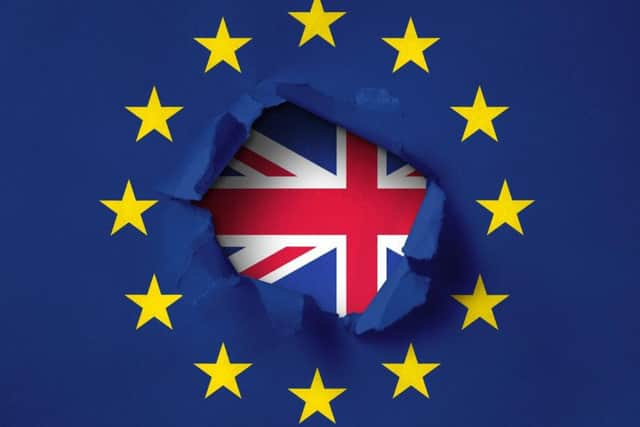Sinn Fein and DUP react to Brexit Yellowhammer predictions for Northern Ireland


The Operation Yellowhammer document, which was leaked to the Sunday Times recently, was released in full on Wednesday night after pressure from MPs.
It said that some cross-border trade would stop and agri-food would be worst hit by tariffs, in the event of a no-deal Brexit.
Advertisement
Hide AdAdvertisement
Hide Ad“Disruption to key sectors and job losses are likely to result in protests and direct action with road blockages,” the BBC reported.


Dated August 2, the document forecasted that some firms would stop trading and those that continued would face higher costs which could be passed on to consumers.
The “reasonable worst case planning assessments” also predicted that the aim of avoiding a hard border may be “unsustainable”.
The document said its intended plan to impose no new checks or tariffs on goods coming from the Republic of Ireland into Northern Ireland would quickly become “unsustainable”.
Advertisement
Hide AdAdvertisement
Hide AdEconomic, legal and biosecurity risks would mean it would have to be changed in a matter of “days or weeks”.
It also suggested a no deal could lead to an increase in cross-border smuggling.
The document also said that up to 13 non-UK vessels could end up fishing illegally in Northern Ireland waters on day one of a no-deal Brexit.
It said around the UK similar situations could lead to clashes at sea.
Advertisement
Hide AdAdvertisement
Hide AdNorthern Ireland firms that export to the EU are to be given advice on how to cope with a no-deal Brexit in a series of events.
The government has insisted that the document is out of date, however it has yet to release any newer document.
Aodhán Connolly, Director of the Northern Ireland Retail Consortium, said: “The papers released by the Chancellor of the Duchy of Lancaster should come as no surprise. It is what we in the retail industry and the NI business community have been saying for many months. A no-deal Brexit will cause availability issues and cost increases that will affect consumers across the UK but most of all in Northern Ireland, especially those most vulnerable.
“The UK growing season is over so in October we are reliant on some foods that will be affected by the potential 2.5 day delays mentioned in the report. The Government admits that its no border, no checks plan is ‘unsustainable’ but it must clarify what this means.
Advertisement
Hide AdAdvertisement
Hide Ad“The report says a no-deal Brexit will see some businesses relocate and others stop trading altogether. When you combine this with the potential loss of data co-operation, concerns over medicines and the potential rise in illegality this is hugely worrying. We are doing all we can as an industry to prepare and for now it is business as usual. But now more than ever we need a deal to protect households and businesses in Northern Ireland”.
Sinn Fein’s Michelle O’Neill said she feared the predictions about disorder could be accurate.
“It is very possible, people have demonstrated in the 2.5 years since the Brexit debate began. So I have no doubt that things like this could happen,” she told the BBC. “But this is the realised implications of Brexit, this is what this means for us.”
Asked if he was comfortable shoring up a government that could tolerate such predictions, DUP MP Sir Jeffrey Donaldson said: “What we are trying to do is work with the government to get a deal.”
Advertisement
Hide AdAdvertisement
Hide AdHe added: “If we had an assembly and an executive functioning I think we would have had a deal by now because Belfast and Dublin would have been talking to each other and we could have arrived at an accommodation.
“We are doing our best to get that deal, to find alternative arrangements that will prevent a hard border on the island of Ireland.”
Crucially, he said, the document does not deal with the “very real scenario” of the backstop being implemented which he said would create “a border in the Irish Sea, which would be devastating for the Northern Ireland economy”.
Michelle O’Neill said Sinn Fein would not accept an all-Ireland agri-food treaty between the UK and the Republic, in order to smooth trade, which the DUP has been considering. She said it would leave other areas of cross border movement out and affirmed that the backstop is her party’s bottom line.
He replied that Sinn Fein’s problem is that they don’t take their seats in Westminster and so have no influence in the debate and that the DUP is trying to find solutions.